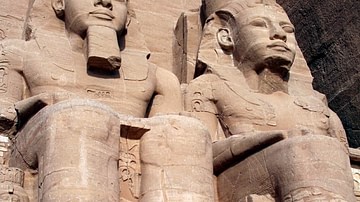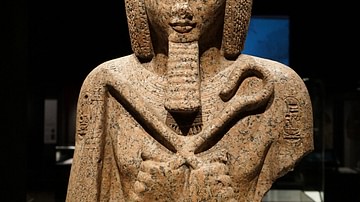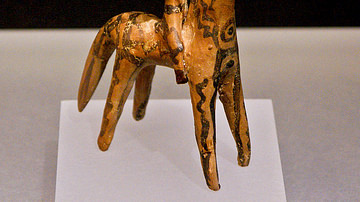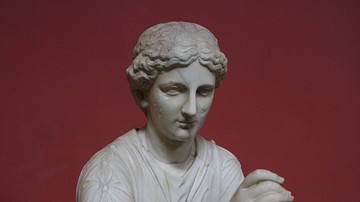The Poem of Pentaur is the official Egyptian record (along with The Bulletin) of the military victory of Ramesses II (known as The Great, 1279-1213 BCE) over the Hittite King Muwatalli II (1295-1272 BCE) at the Battle of Kadesh in 1274 BCE. So proud was Ramesses II of this campaign that he had the poem, which details his personal valor against overwhelming odds, inscribed on the walls of temples at Abydos, Luxor, Karnak, Abu Simbel and in his Ramesseum.
Victory or Draw
The Hittite account of the battle differs significantly in that Muwatalli II also claimed a great victory at Kadesh. Although it is generally understood today that the battle was probably a draw, scholars still form sides and argue total victory for either the Hittites or the Egyptians. As there are no independent accounts of the Battle of Kadesh it is unlikely that a definitive conclusion as to who actually won the conflict will ever be reached.
Early scholars followed the lead of James Henry Breasted who, in 1903, interpreted the Poem of Pentaur as literal, historical truth and, in so doing, passed on Ramesses II's account of the Battle of Kadesh as fact. It was not until the clay copy of the Hittite version of the battle was found in the city of Hattusa in Asia Minor that the Egyptian claim in the Poem was challenged.
The fact that the Hittites continued to occupy the city of Kadesh after the battle (and harried trade caravans from that site until a peace treaty was signed) supports the Hittite claim to victory in that Ramesses II was unable to achieve his stated objective to drive his opponents from the area and take the city. Even so, that Ramesses II and his army drove the enemy from the field, inflicting heavy casualties (a claim which can be supported by both accounts) and returned with his forces more or less intact to Egypt, supports the Egyptian claim to victory.
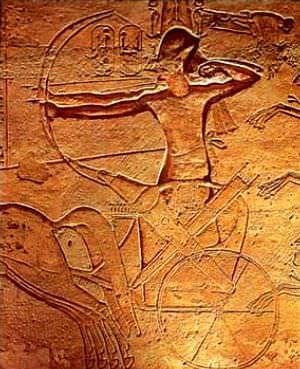
The World's First Peace Treaty
The Battle of Kadesh and the ensuing skirmishes between the Hittite and Egyptian forces led, finally, to the world's first peace treaty in 1258 BCE in which Ramesses II of Egypt and Hattusili III (died 1237 BCE) of the Hittites promised to respect each other's boundaries and not make war against their brother king. This treaty was important for a number of reasons but, most notably, it allowed for open communication, commerce, and trade between the two nations which benefited both far more than their years of destructive warfare.
The Hittites were masters or iron work and generously sent their blacksmiths and metalworkers to Egypt to instruct Egyptians in how to improve their weapons and tools. The Egyptians, famous for their agricultural knowledge and technique, shared this with the Hittites. Further, a major stipulation of the treaty was that the two would not harbor royal fugitives who fled from their home country to seek sanctuary in the other but would, instead, return these to face justice. It was a common enough occurrence in antiquity for a noble to initiate a coup, manage to escape retribution if it failed, and find refuge in a foreign country where he could garner support and weapons for a second attempt. The treaty nullified this threat and bound the two kings together as brothers who would watch out for each other's interests.
The Poem of Pentaur
None of this good will is evident in the earlier Poem of Pentaur, however, which describes the Hittites as the enemies of the people of Egypt and Muwatalli II as "the wretched one". The central focus of the poem is on Ramesses II's courage, resourcefulness, and skills and on the grace of the Egyptian gods (especially Amun) who came to the king's aid in his time of need.
Ramesses II is here depicted as the quintessential Egyptian warrior-king who sees what needs to be done and is able to do it without fear or hesitation. Finding himself in an impossible situation, he does not even consider retreat or surrender but hurls himself at the superior numbers of his enemies and inspires his men to follow his lead. When one considers the magnificence of the prose, the pacing of the piece and its dramatic structure, it is little wonder that Ramesses II had the piece engraved in stone throughout Egypt.
The following excerpts from the Poem of Pentaur are from the walls of the Karnak Temple as translated by James Henry Breasted:
Here beginneth THE VICTORY OF THE KING OF UPPER AND LOWER EGYPT USIMARE`RE`SETPENRE`, the Son of RE`RA`MESSE-MIAMUN, given life eternally, which he achieved in the land of Khatti, Nahrin, in the land of Arzawa, in Pidasa, in the land of Dardany, in the land of Masa, in the land of Karkisha and Luka, in Charcamesh, Kedy, the land of Kadesh, in the land of Ugarit, Mushanet. Now his majesty was a youthful lord, active and without his peer; his arms powerful, his heart stout, his strength like Mont at his moment; goodly of form like Atum, one rejoices at seeing his beauty; great of victory over all foreign countries, one knows not when he will begin to fight; a strong wall about his army, their shield on the day of fighting; a bowman without his like; he is braver than hundreds of thousands combined; going ahead and entering in among multitudes, his heart trusting in his strength; powerful of heart in the hour of close combat; like a fir at its time of consuming; firm of heart like a bull ready upon the battlefield; he cares not for all lands combined; a thousand men are unable to stand firm before him; hundreds of thousands are discomfitted at beholding him; inspiring fear; loud of roarings in the hearts of all lands; great of majesty and powerful of renown like Sutekh; ... in the hearts of foreigners; like a savage lion in the valley of desert animals; advancing bravely and returning only when he has triumphed face to face; not speaking boastfully; effective of counsel and good of plan; one finds what one needs through his first reply; saving his army on the day of fighting; [great protector of] his chariotry; bringing home his followers and King of Upper and Lower Egypt Usimare`- setpenre`, the Son of Re`,Ra`messe-miamun, given life.
Now His Majesty had made ready his infantry and his chariotry, and the Sherden of His Majesty's capturing whom he had brought back by the victory of his strong arm; supplied with all their weapons, and the plan of fighting having been given to them. His Majesty journeyed northward, his infantry and his chariotry with him, and he made a good beginning upon the march in Year 5, second month of the summer season, day 9. His majesty passed the fortress of Tjel, being powerful like Mont in his going forth, all foreign countries trembling before him and their chiefs bringing their gifts, all those who were disaffected being come bowing down through fear of His Majesty's might. His army went along the narrow defiles like one which is upon the roads of Egypt. Now when days had passed over these things His Majesty was in Ra`messe-miamun, the town which is in the Valley of the Cedar. And His Majesty proceeded northward. But when His Majesty had reached the hill country of Kadesh, then His Majesty went ahead like Mont, the lord of Thebes,and he crossed the ford of the `rnt'1) with the first army of Amun-gives-victory-to- Usima`re-setpenre`. His Majesty arrived at the town of Kadesh, and now the wretched Fallen one of Kadesh was come and had collected together all the foreign countries as far as the end of the sea; the entire land of Khatti was come, that of Nahrin likewise, that of Arzawa, Dardany, that of Karkisha, Luka, Kizzuwadna, Carchemish, Ugarit, Kedy, the entire land of Nukhashshe, Mushanet, Kadesh; he left no foreign country not to bring it of every distant land, their chiefs there with him; every man with his infantry and their chariotry exceeding many, without limit of the like of them. They covered mountains and valleys and they were like the locust by reason of their multitude. He left no silver in his land, he stripped it of all its possessions and gave them to all the foreign countries in order to bring them with him to fight.Now the wretched one of Khatti, together with many foreign countries which were with him, stood concealed and ready to the northeast of the town of Kadesh, but His Majesty was alone by himself with his followers, the army of Amun marching after him, the army of Pre` crossing the ford in the neighborhood south of the town of Shabtuma at a distance of 1 iter from where His Majesty was, the army of Ptah being to the south of the town of Aronoma and the army of Sutekh marching along the road, and His town of Aronoma and the army of Sutekh marching along the road, and His Majesty had made the first battle-force out of all the leaders of his army, and they were upon the shore of the land of Amor. But the wretched Chief of Khatti stood in the midst of the army which was with him and did not come out to fight through fear of His Majesty. But he had sent men and horses exceeding many and multitudionous like the sand, and they were three men on a chariot and they were equipped with all weapons of warfare. They had been made to stand concealed behind the town of Kadesh, and now they came forth from the south side of Kadesh and broke into the army of Pre` in its midst as they were marching and did not know nor were they prepared to fight.
Thereupon the infantry and the chariotry of His Majesty were discomfited before them, but His Majesty stood firm to the north of the town of Kadesh an the western side of the `r-n-t' [see reference to 1)]. Then they came to tell it to His Majesty. Then His Majesty appeared in glory like his father Mont, he assumed the accoutrements of battle, and girded himself with his corslet, he was like Ba`al in his hour, the great horse which bore His Majesty being Victory-in-Thebes of the great stable of Usimare`re`-setpenre`, beloved of Amun.
Thereupon the wretched chief of Khatti sent and did homage to my name like that of Re', saying `Thou art Sutekh, Ba'al in person. The dread of thee is a brand in the land of Khatti.' Then he caused to come his envoy bearing a letter in his hand in the great name of My Majesty, of the Residence of Re'-Harakhati The-Strong-Bull- beloved-of-Truth, sovereign who protects his army, mighty on account of his strong arm, a wall for his soldiers on the day of fighting, the King of Upper and LowerEgypt Usimare`re`-setpenre`, the Son of Re`, lion lord of the strong arm Ra`messe-miamun, given life eternally. `Thy servant speaks and causes it to be known that thou art the Son of Re who came forth from his body. He has given to thee all lands combined in one place. As for the land of Egypt and the land of Khatti, thine they are, thy servants, they are under thy feet. Pre` thy noble father has given them to thee. Prevail not over us. Behold, thy might is great, thy strength is heavy upon the land of Khatti. Is it good that thou killest thy servants, thy face savage towards them, and hast no pity? See, thou didst spend yesterday killing hundreds of thousands. Thou art come today and hast left no heirs. Be not hard in thy dealings, victorious king. Peace is better than fighting. Give us breath.
...Then Thy Majesty gave command to hearken to his words and I made a move peacefully southwards.His Majesty turned back in peace to Egypt together with his infantry and his chariotry, all life, stability and dominion being with him,
Reaching Egypt in peace to Pi-Ra`messe-miamun-Great- of-Victories, and resting in his palace of life and dominion like Re` who is in his horizon, the gods of this land coming to him worshipping and saying, `Welcome, our beloved son, the King of Upper and Lower Egypt, Usima`re`-setpenre`, the Son of Re`Ra`messe-miamun and they gave to him millions of Sed-festivals forever on the throne of Re`, all the lands and all the foreign countries being fallen prostrate beneath his sandals for eternity and everlasting.

